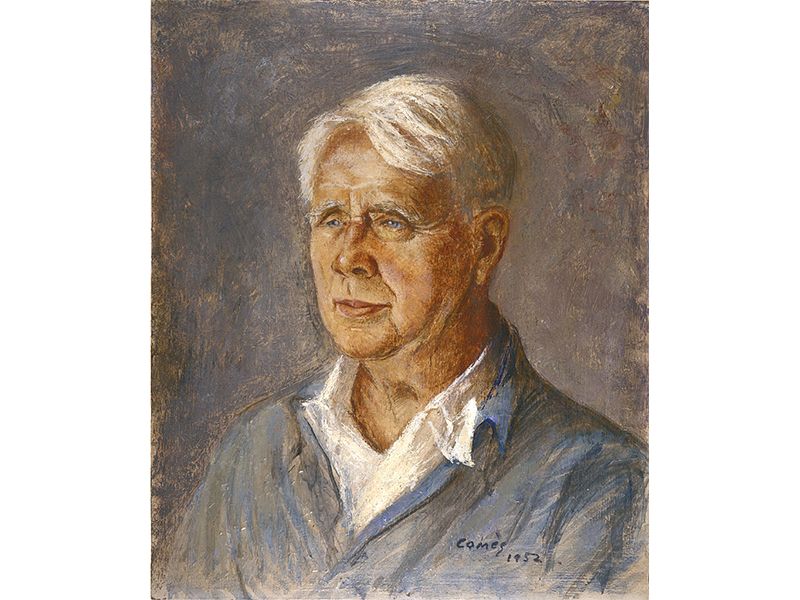How Did the Cruellest Month Come to Be the Perfect 30 Days to Celebrate Poetry?
A Smithsonian historian makes the case why springtime is the best time to reawaken a thirst for verse
/https://tf-cmsv2-smithsonianmag-media.s3.amazonaws.com/filer/c4/c0/c4c02ccd-6566-4783-9c36-fedd25d29002/npg_86_88-eliot.jpg)
The “National Month” commemoration is a fairly harmless political boondoggle, involving a governmental proclamation and some degree of public programming by those concerned. Some of the “Months” are well-meaning attempts to rectify past wrongs, in particular February’s designation as “Black History Month” and November as “National Native American Heritage Month.” Other commemorative months are lesser known and the subjects are, shall we say, not especially compelling: January is “National Mentoring Month.” And we honor pets in May and honey in September.
But in 1996 after a push by the Academy of American Poets, April was designated as National Poetry Month. Since good causes abound and politicians can never resist over-egging the pudding, in April it is also Financial Literacy Month and Earth Awareness Month, among at least a dozen others.
In his 1996 proclamation, President Bill Clinton, who is a big fan of that most vernal of poets Walt Whitman, said that National Poetry Month “offers us a welcome opportunity to celebrate not only the unsurpassed body of literature produced by our poets in the past, but also the vitality and diversity of voices reflected in the works of today's American poetry.” Interestingly, there is no (at least so far) National Novel or National Nonfiction Month indicating perhaps that poetry inhabits a special, protected status in the culture that does, indeed, need commemoration. I tend to agree, since poetry always seems to be in danger of disappearing while simultaneously being recognized as a heightened form of rhetoric, admired and valued—even when it is neglected. It’s like a literary version of an endangered species.
But why April? No reason is evident or at least one that I can find. In England poetry month is October for reasons that are also unclear. Given the tradition of Anglo-American verse, one might have expected a common agreement about which month was appropriate. The irony is, of course, that “April is the cruellest month.” Maybe someone with either a tin-ear or a mordant sense of humor (perhaps even some legislative draughtsman who hates poetry) remembered or half-remember these opening words of T.S. Eliot’s “The Waste Land,” one of the most celebrated poems in modern history. If it was in fact Eliot’s famous words that decided it for April, it was a good call, because Eliot's epithet about the fourth month is so well known, though perhaps not the verse itself.
April is the cruellest month, breeding
Lilacs out of the dead land, mixing
Memory and desire, stirring
Dull roots with spring rain.
I tend to think that if “April” was half-remembered as being associated with poetry, it was for reasons that are the obverse of the themes enunciated in “The Waste Land.” Perhaps Eliot’s indictment of the month triggered a backlash. Commonly, poetry is seen as revivifying. It expresses in heightened language the quickening of the language and of the human spirit. Poetry is valued—and society is periodically shamefaced about how callously it ignores poetry and poets—precisely because for many people it articulates a sense of promise and hope.
So April works for poetry because we do, contra Eliot, yearn for new beginnings, a fresh start and an upsurge of beauty in the natural world after the monochrome of winter. Compare Eliot with the opening to Chaucer’s “Canterbury Tales,” which states the more accepted and optimistic view of spring, “When April with his showers so sweet/ Has pierced the drought of March to the root.. . “ A line which echoes in the popular rhyme, April showers bring May’s flowers. The subject of spring as a time of renewal, rebirth, and flowering is a time honored theme (or indeed a cliché) in poetry.
From an ode by Horace, “The snow dissolv’d no more is seen,/ The fields, and woods, behold, are green. . .” to Wordsworth’s daffodils, “And then my heart with pleasure fills/ And dances with the daffodils.” And you can see a visual echo of the daffodils in Robert Frost’s wonderful line, “Nature’s first green is gold.”
Frost, consistent in his curmudgeonliness, also reminds us that we are easily fooled by a false spring: “winter was only playing possum.”
But the temptations of a warm day are hard to resist and it’s irresistable not to see the cycle of rebirth played out in both our personal lives or even in the lives of nations (the “Springtime of Peoples” for the revolutions of 1848 or, more recently, the “Arab Spring”).
It’s hard to resist the theme of renewal and fresh beginnings; one of the most ecstatic of contemporary nature poets, Mary Oliver, writes, “Listen, everyone has a chance. /Is it spring, is it morning?” And of course spring is the season of love—even sex.
Surprisingly, there don’t appear to be many poems about spring being the occasion for people to write poetry. The blooming and buzzing of natural renewal is the attraction, not the act of literary creation.

In Horace’s ode, he goes on to describe how spring causes the Graces, one of whom is creativity, to move into dance after winter’s slumber but this simply restates the theme. Curiously, it is our old friend Eliot who, after his dismissal of the romantic view (April is cruel) goes on to argue that it is precisely out of this cruelty that poetry arises. Winter is warm and comforting under its “forgetful” snow. April and springtime are cruel because the reawakening of the earth causes a stirring of consciousness. Re-birth–thinking, writing a poem–is painful.
Growth is painful. Salvation no less so. It’s no accident that the major religions have their holy days–the “hush of ancient sacrifice” in Wallace Stevens’ words—in springtime. However it came about, April is the perfect month to celebrate the passion that is poetry.
/https://tf-cmsv2-smithsonianmag-media.s3.amazonaws.com/accounts/headshot/David_Ward_NPG1605.jpg)



/https://tf-cmsv2-smithsonianmag-media.s3.amazonaws.com/accounts/headshot/David_Ward_NPG1605.jpg)